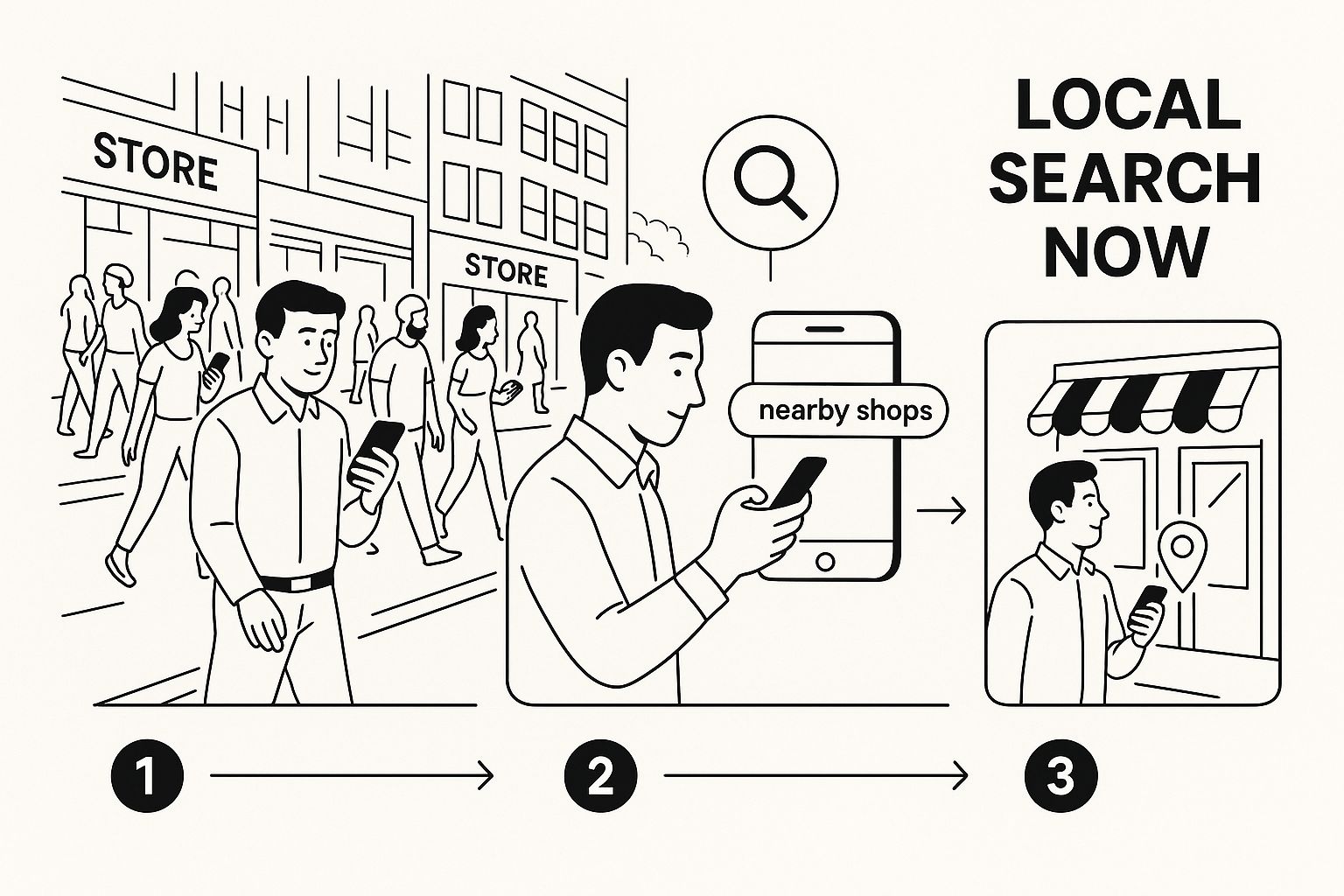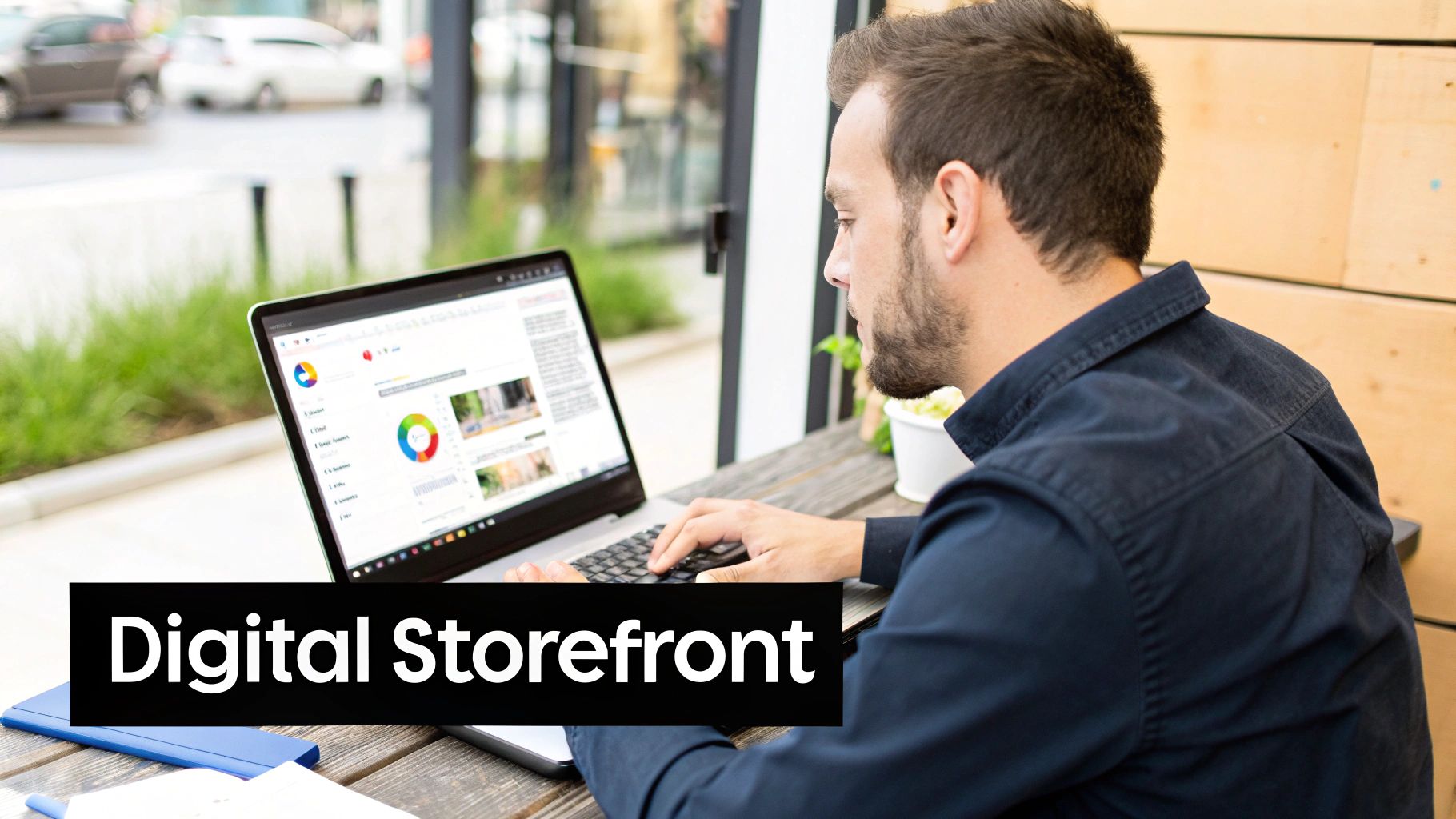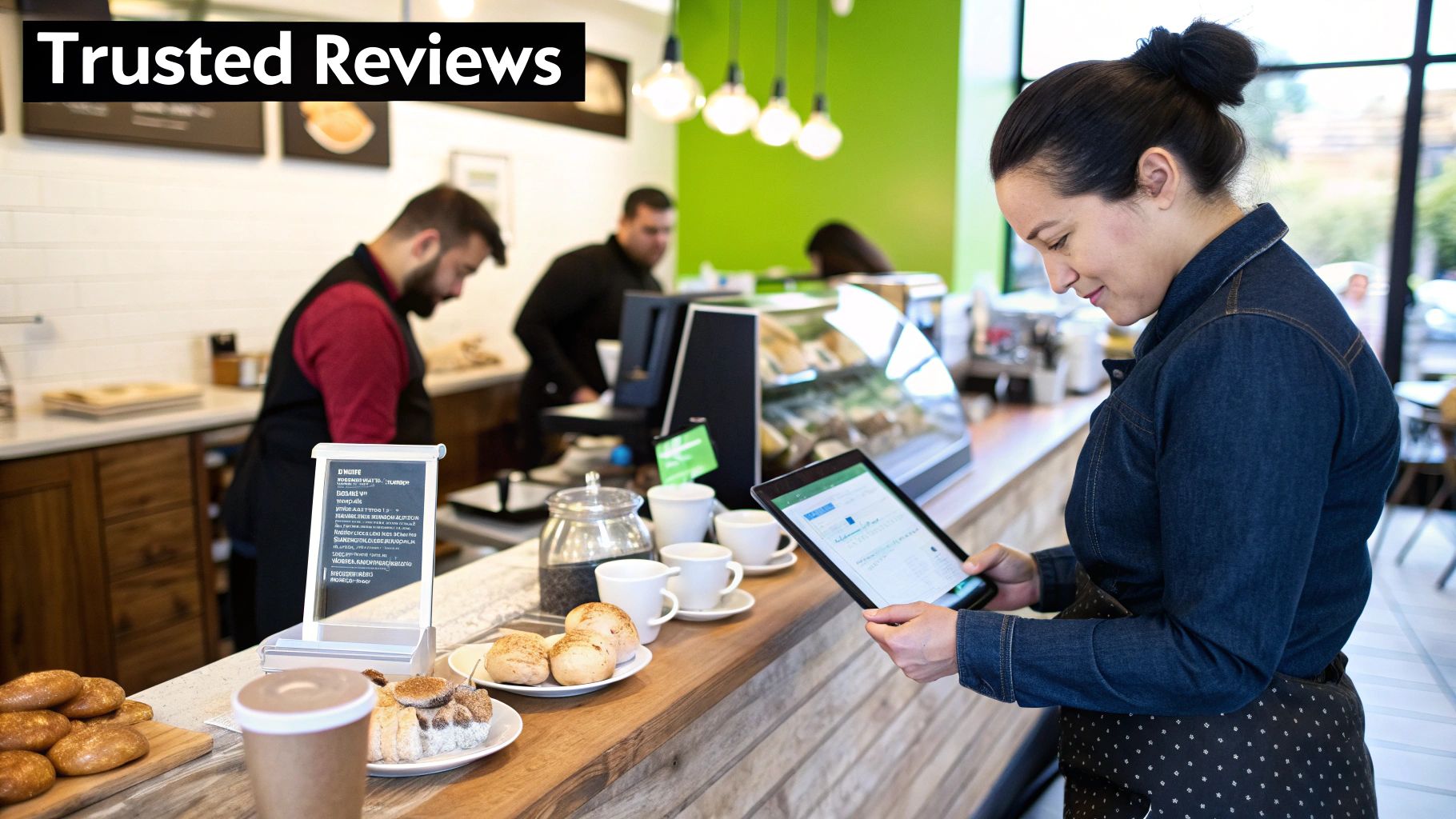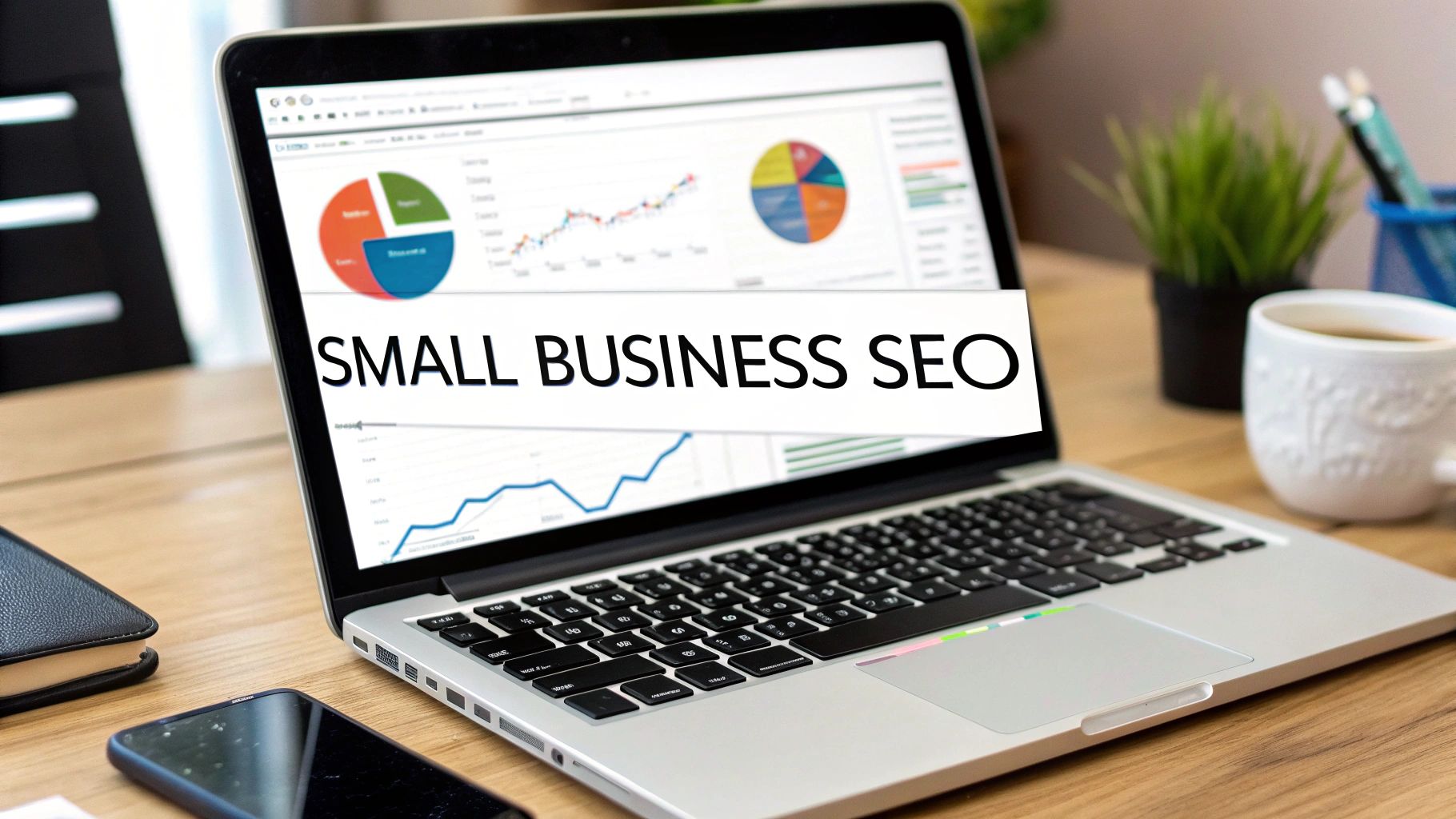
Boost Your Business with Local SEO for Small Businesses
0
10
0
Local SEO is pretty straightforward: it’s all about tweaking your online presence so you’re the first business people see when they search for something local. When someone in your town searches for what you offer, you need to show up. It’s that simple.
Why Local Search Is Your Biggest Opportunity
Let’s be honest, nobody is flipping through the Yellow Pages anymore. Your customers are on their phones, right now, searching for a "plumber near me" or the "best coffee shop in Bristol." This shift isn’t a trend; it's just how people find things now, and it’s the single biggest reason why local SEO is non-negotiable for survival and growth.
For a local business, being visible is everything. You could have the most amazing products or be the most reliable service in the area, but if potential customers can't find you online, you’re basically invisible. This is where a sharp, focused approach to local SEO for small businesses comes in. You're not trying to take on the massive national chains; you're just trying to win the battle on your home turf.
Connecting Searches to Sales
The journey from a quick Google search to a customer walking through your door is shorter than you’d think. People making local searches aren’t just browsing—they're ready to buy. They have a problem that needs solving now, and your business can be the answer.
This is what that journey looks like for a modern customer.

As you can see, it’s a direct line from an online query to an in-person visit, all driven by how visible you are in local search results.
The data backs this up, big time. An incredible 98% of UK consumers now use the internet to find local businesses. On top of that, local searches make up 46% of all Google searches, showing just how many people are looking for solutions right around the corner.
Here's the real kicker: when someone searches for a local business on their smartphone, 76% of them visit a physical location within 24 hours. And of those visits, 28% turn into a sale.
Local SEO isn't just another marketing buzzword; it's a direct response to how modern consumers actually behave. Ignoring it means you're actively choosing to be invisible to most of your potential customers.
If you want to zoom out and see how this fits into the bigger picture, this complete guide to digital marketing for local businesses is a great read.
Looking at these numbers makes one thing crystal clear: getting good at local search is the most direct way to connect with customers who are pulling out their wallets.
Ready to make your business the go-to choice in your area? Baslon Digital builds stunning websites backed by powerful local SEO to get you noticed. Contact us today for a personalised consultation.
Your Google Business Profile Playbook
Think of your Google Business Profile (GBP) as your shop's digital front door. It’s often the very first impression a potential customer gets of your brand, making it an absolute cornerstone of any local SEO strategy. A well-tended profile isn't just a static listing; it's a dynamic magnet for attracting and talking to customers.
Just setting it up isn't enough. The real magic happens when you dive into the details that most of your competitors probably ignore. This is how you turn a simple business listing into a customer-grabbing machine.

Nail the Fundamentals First
Before you start playing with the fancy features, your core information has to be flawless. Seriously. Accuracy and consistency are everything here—they build trust with both your customers and with Google itself.
Your profile’s strength starts with a few key pieces:
Precise Business Categories: Don't just pick 'Restaurant'. Are you an 'Italian Restaurant'? A 'Pizza Delivery' service? Be specific. Google lets you add multiple categories, so use them to attract exactly the right kind of customer.
A Compelling Business Description: This is your chance to tell your story. Write a description that naturally weaves in what you do and where you do it. For example, a web designer in London might say something like, "custom Wix website design for small businesses in London."
High-Quality Photos and Videos: Show, don't just tell. Post clear, professional snaps of your work, your team, and your place of business. According to Google, businesses with photos get 42% more requests for directions and 35% more clicks to their websites. Those aren't small numbers.
Keep Your Profile Active and Engaging
A dusty, untouched profile is a massive missed opportunity. Google rewards businesses that actively manage their listings because it’s a big hint that the information is up-to-date and trustworthy. This is where you bring out features like Posts and the Q&A section.
It's now understood that your Google Business Profile accounts for roughly 19.2% of local search ranking factors. In the UK, small businesses that pop keywords into their descriptions see 31% more visibility in the local map pack. Even better, those who regularly update with posts show up 2.8 times more often in the top map results.
A complete and active Google Business Profile isn't just a placeholder—it's a living advertisement that works for you 24/7. It tells Google you are a legitimate, active business worthy of being shown to local searchers.
Basically, you need to treat your profile like you would any other social media channel. Keep it fresh.
Leverage Advanced GBP Features
Once your foundation is rock solid, it’s time to use the features that will push you ahead of competitors who just do the bare minimum.
Google PostsThink of Google Posts as free mini-adverts that pop up right on your profile in the search results. They’re perfect for:
Shouting about a special offer or sale.
Highlighting a new product or service.
Sharing company news or an upcoming event.
Showing off a recent five-star review.
Posts expire every seven days, so the trick is to be consistent. A simple post once a week can make a huge difference in keeping your profile looking active and fresh.
Questions & Answers (Q&A)This feature lets anyone ask a question about your business, and—crucially—anyone can answer. You want to be the one answering first.
Get ahead of the game by populating this section yourself. Think about the most common questions you get asked, post them, and then answer them straight away. This lets you control the narrative and gives potential customers valuable info upfront.
Services and ProductsIf you have specific services or products, list them out. You can add descriptions and even prices. This helps customers see what you offer at a glance without having to dig through your website, making their decision to contact you that much easier.
By treating your Google Business Profile as an essential marketing tool, you create a powerful first impression that drives real-world results.
Feeling a bit overwhelmed? Baslon Digital specialises in creating stunning websites and optimising your online presence to attract local customers. Get in touch with us today to see how we can help your business grow.
Turning Your Website Into a Local Magnet
Think of your Google Business Profile as the friendly welcome mat at your digital front door. It gets people's attention. But your website? That's the main event. It's where you close the deal and turn a casual browser into a loyal customer.
Your GBP might get you noticed, but your website is what convinces people you're the real deal. It needs to scream "local expert" not just to your customers, but to Google as well. This is the engine room of your local SEO for small businesses strategy.
Weave Your Location into Your Website's DNA
You need to speak your customers' language, and that includes their location. If you’re a Bristol-based business, your website should feel like it was made in Bristol, for Bristol. This means naturally sprinkling location-specific terms throughout your site to prove you belong.
Get started by tweaking the most powerful on-page elements:
Page Titles: Don't just say "Our Services." Get specific. "Plumbing and Heating Services in Manchester" tells Google exactly who you serve.
Headers (H1, H2, etc.): Your main H1 heading is prime real estate. Make it count. Something like, "Expert Wix Website Design for London Businesses" leaves no room for doubt.
Content: Talk about the community you're part of. Mention local landmarks, specific neighbourhoods, or events you’ve sponsored. A York-based bakery could blog about supplying pastries for a local festival—it's genuine and locally relevant.
This isn't about awkwardly stuffing keywords until your sentences sound like a robot. It’s about letting your local identity shine through in your writing. For a deeper dive, check out our guide on how to master website optimisation for search engines.
Create Dedicated Pages for Each Location
If your business has a presence in more than one town, creating a unique page for each location is an absolute game-changer. And I don’t mean just copying the same page and swapping out the city name—Google sees right through that.
Each location page needs to be its own unique hub. Be sure to include:
The exact address and a local phone number for that branch.
Specific opening hours.
An embedded Google Map pinpointing that location.
Photos of your local team or the actual storefront.
Testimonials from customers in that specific area.
This strategy stops both users and search engines from getting confused and gives each of your branches a fighting chance to rank in its own right.
Ensure Your NAP is Flawless Everywhere
NAP stands for Name, Address, and Phone number. This little trio is the bedrock of your local SEO. It has to be identical everywhere—on your website, your GBP, and every single online directory you’re listed in.
I see this mistake all the time. A business uses "Ltd." on its website but "Limited" on its GBP. That tiny difference is enough to confuse search engines and water down your local authority. Every single detail matters.
The best place for your NAP is right in the footer of your website. Pop it on every page. This makes it dead simple for visitors to find and for search engine crawlers to verify.
Embrace the Mobile-First Reality
You can't ignore mobile anymore. The data is screaming at us. In the UK, an estimated 84% of local searches happen on a mobile device. And even more telling? 50% of people who do a local search on their phone will visit a shop within a day. You can see the full picture with these local search statistics.
What does this mean for you? Your website must work flawlessly on a small screen. If a potential customer is out and about, finds you on their phone, and your site is a clunky mess, they're gone. They'll just tap back and go straight to your competitor.
Focus on fast loading times, big tap-friendly buttons, and text that’s easy to read. Your website is your digital HQ—by optimising it with these local signals, you turn it from a static brochure into a powerful magnet for local customers.
Ready to turn your website into a local search powerhouse? Baslon Digital designs beautiful, optimised Wix websites that get you found by the customers who matter most. [Contact us today for a free consultation!](https://www.baslondigital.com/)
Earning Local Trust with Citations and Links
Beyond your own website and Google profile, your business's reputation gets built all over the web. Think of local citations and links as digital shout-outs or votes of confidence. They’re massive signals to search engines that you’re a legitimate, trusted business and a real part of the local scene.
Getting this right is a cornerstone of any decent local SEO for small businesses strategy. This isn't about plastering your name everywhere you can; it’s about showing up consistently in the right places.
What on Earth Are Local Citations?
A local citation is just an online mention of your business's Name, Address, and Phone number (what we call NAP). You’ll find them in online directories, on local news sites, or in industry-specific listings. The golden rule here? Consistency.
Every single citation acts as another small proof that your business exists where you say it does. When Google’s little web crawlers find the exact same NAP details for you across dozens of reputable sites, it tells them your info is solid. That gives them the confidence to show you in local search results.
Inconsistent data, on the other hand, is a recipe for confusion. A slightly different business name or an old address can seriously dent your rankings.
Every tiny detail matters. If your official business name is "A B C Plumbing Ltd.," it needs to look like that everywhere. Don't let "ABC Plumbing" pop up on one site and "A B C Plumbing Limited" on another. Consistency is your best friend.
Building Your Foundational Citations
First things first, start with the big, authoritative directories. Forget about submitting to hundreds of spammy, low-quality sites. Quality always, always trumps quantity. For businesses here in the UK, a solid starting point is a mix of general directories and platforms relevant to your specific industry.
To get you started, we’ve put together a list of some of the heavy hitters. Securing accurate listings on these high-authority platforms builds a powerful foundation for your local online presence.
Essential UK Citation Sources for Small Businesses
Directory/Platform | Type | Key Benefit |
|---|---|---|
Yell | General | One of the UK's most recognised and trusted business directories. |
Thomson Local | General | A long-standing directory with high authority in UK search. |
Scoot | General | A wide-reaching network that distributes data to other directories. |
Your Local Chamber of Commerce | Local Community | A highly trusted and geographically relevant link and citation. |
TripAdvisor/Checkatrade | Industry-Specific | Essential for businesses in hospitality or trades, respectively. |
When you’re setting these up, don’t just dump your NAP and run. Take the time to fill out each profile completely—add photos, your website link, and a proper description of what you do. It all helps.
The Real Power of Local Backlinks
While citations are great for verifying your details, backlinks are what build your authority. A backlink is simply a clickable link from another website to yours. Search engines see these as endorsements. A link from a respected local website is like that site telling Google, "Hey, this business is a big deal around here."
But how does a small business with a tight budget actually get these precious links? You don’t need a massive marketing team. You just need to get a bit creative and connect with your community. If you want to dive deeper into why these links are so important, check out our guide on what backlinks are and why you should care.
Here are a few real-world tactics any business can try:
Sponsor the local kids' football team. It's a brilliant way to support your community, and it almost always gets you a link back to your website from the team's or league's sponsorship page.
Host a small community event. This could be anything from a free workshop to a charity coffee morning. Local bloggers and news outlets are often crying out for community stories to share and will probably link to your event page.
Team up with a neighbouring business. Find a non-competing business and run a joint promotion. For instance, a local bookshop could partner with a nearby café for a "read and relax" discount. You can then shout about it on both your websites, linking to each other.
Join local business associations. Groups like your local Chamber of Commerce often list their members in an online directory, complete with a lovely link back to your site.
These strategies do more than just build links. They weave your business into the fabric of your local area, creating genuine connections that boost both your online authority and bring real people through your door.
Ready to build a trusted online presence that brings local customers to your door? Baslon Digital can help create a stunning website and an SEO strategy to match. Contact us for a personalised consultation today!
Using Customer Reviews to Fuel Growth
Think of reviews as the new word-of-mouth. They're the social proof that drives a massive amount of local business, acting as a powerful currency of trust online. For search engines, they're a huge clue about your reputation.
Honestly, a steady stream of genuine reviews is one of the core pillars of any solid local SEO for small businesses strategy.
This isn't just about collecting gold stars. A well-managed review strategy is what convinces potential customers you're the right choice. It also signals to Google that you're a trusted, active, and reputable local business worth showing to searchers.

Creating a Simple System for Getting More Reviews
Most happy customers are perfectly willing to leave a review; they just need a gentle, well-timed nudge. The trick is to make it ridiculously easy for them. Nobody wants to jump through hoops to do you a favour.
Your goal is to build a simple, repeatable process for asking. This doesn't need to be some complex, automated system with expensive software. Start with these dead-simple tactics:
Ask in person. The moment a customer is beaming about the service they’ve just received? That's your golden opportunity. A simple, "That's brilliant to hear! If you have a spare moment later, we'd be so grateful if you could share your thoughts in a Google review. It really helps others find us," works wonders.
Use a simple link. Google gives you a direct link that takes customers straight to the review box for your business. Pop this link in your email signature, on your invoices, and in any follow-up messages.
Create a QR code. For physical spots like shops or cafés, a small sign at the till with a QR code linking to your Google review page is incredibly effective. Customers can scan it with their phone while they wait.
The best time to ask is right after a positive interaction, while the great experience is still fresh in their mind. Don't be pushy. A friendly, low-pressure request is all it takes.
The Art of Responding to Every Single Review
Getting reviews is only half the battle. How you respond is what truly sets you apart and protects your hard-earned reputation. Replying shows you actually care, and it gives you a public stage to show off your brilliant customer service.
Replying to reviews isn't just good customer service—it's good SEO. Google has even confirmed that responding to reviews improves your local visibility. It shows them you're an engaged business owner who values what customers have to say.
You absolutely need a clear game plan for handling both the glowing praise and the occasional grumble.
Responding to Positive ReviewsThis is the easy part, but don't get lazy and just drop a generic "Thanks!"
Thank them personally: Use their name if you can see it.
Be specific: Mention something they talked about in their review. For example, "We're so glad you enjoyed the homemade scones!" It shows you're not a robot.
Invite them back: End with a warm invitation to return.
A great response proves you’ve actually read their feedback and reinforces that positive experience they had.
Handling Negative Reviews GracefullyA negative review can feel like a punch to the gut, but it's actually an opportunity. Never, ever ignore it, and definitely don't get into a public slanging match.
Acknowledge and apologise: Start by thanking them for the feedback and apologising that their experience wasn't up to scratch.
Don't get defensive: Just stick to the facts and express a genuine desire to make things right.
Take it offline: Provide a contact name, email, or phone number and ask them to get in touch so you can sort the issue out privately. This shows everyone else reading that you're proactive about solving problems.
A professional, empathetic response can often turn a disgruntled customer into a loyal one. More importantly, it demonstrates to everyone else that you take concerns seriously. A consistent flow of fresh, positive feedback is one of the most powerful assets you have.
Need help building a trusted online presence that brings local customers to your door? Baslon Digital can create a stunning website and a review management strategy to match. Contact us for a personalised consultation today! https://www.baslondigital.com
Right, you've absorbed a lot of theory. But theory doesn't get customers through the door. Action does.
This is where we turn all that knowledge—Google Business Profile, on-site tweaks, citations, and reviews—into a simple, doable plan. The goal here is a clear roadmap, not a mountain of work that you'll put off until next Tuesday.
Let's start with some quick wins. These are the small, satisfying tasks you can knock out this week to get the ball rolling and see some immediate movement.
Quick Wins for This Week
Do a Google Business Profile Health Check: Open up your GBP and look at it with fresh, critical eyes. Is every single section filled out? Are your opening hours, address, and phone number 100% correct? No typos, no old information. Get it perfect.
Reply to Your Last 5 Reviews: Jump into your reviews and respond to the last five you've received. Yes, the good and the bad ones. It signals to Google (and curious customers) that you're switched on and engaged.
Tweak a Key Page Title: Pick your most important service page—the one that makes you the most money. Now, add your city or town to the title tag. It's a tiny change that punches well above its weight in local SEO terms.
Once those are ticked off, the real work begins: building a routine. This isn't a one-and-done job. Consistent, scheduled effort is what separates the businesses that thrive locally from those that just exist.
The local businesses that win are the ones who treat their local SEO like any other core business function—something that gets regular attention, even if it's just an hour a week.
Ready to stop reading and start doing? If you'd rather have an expert in your corner to speed things up, Baslon Digital offers personalised local SEO consultations to get your business seen by the right people.
Contact us today to get started.
Common Questions About Local SEO
Jumping into local search always kicks up a few questions. We get it. To cut through the noise, here are some straight answers to the things we hear most from small business owners just like you.
How Long Does Local SEO Take to Work?
Local SEO isn't like flicking a switch; the results build up over time. You might see some quick wins within a few weeks, especially after getting your Google Business Profile in order.
But for the more competitive stuff and to build real authority, it’s far more realistic to expect noticeable results in three to six months. Honestly, consistency is your best friend here.
Do I Need a Website for Local SEO?
Technically, you can rank in the local map pack with just a really well-optimised Google Business Profile. But—and it's a big but—a website gives you a massive advantage.
Your website is a digital space you completely own and control. It’s the central hub for your business, letting you go into way more detail, build trust, and grab leads in a way a GBP listing just can't on its own.
Think of your GBP as the sign outside your shop and your website as the shop itself. You really need both to convince customers to come inside.
Is Local SEO a One-Time Task?
Absolutely not. This is probably the biggest misconception we see. Local SEO is an ongoing effort, not a set-it-and-forget-it task.
Your competitors are always trying to outrank you, new reviews need managing, and Google's algorithms are constantly changing. Sticking with it—even for just a few hours a month—is essential to keep and grow your spot at the top. If you're new to the whole concept and need a solid foundation, our simple definition of what SEO is for beginners is a great place to start.
Putting in this continuous effort is what ensures your business stays the go-to choice for local customers.
Ready to turn these answers into action and get your business seen? Baslon Digital specialises in creating stunning Wix websites backed by powerful local SEO strategies that actually get results for small businesses.
Contact us today for a free, no-obligation consultation!
Ready to dominate local search and connect with more customers in your area? The strategies in this guide are your roadmap to success. Implementing them consistently will put you head and shoulders above the competition. If you're ready to accelerate your growth and want an expert partner to guide you, Baslon Digital is here to help. Contact us today for a personalised consultation!


